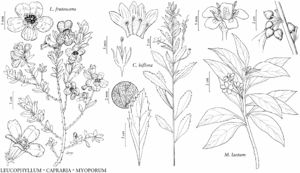Myoporum laetum
Fl. Ins. Austr., 44. 1786.
Shrubs or trees, broadly spreading, 30–100 dm. Stems ascending to prostrate, much branched; twig tips and young leaves bronze green, sticky. Leaves: blade bright green, lanceolate, 5–12.5 × 1.5–3 cm, margins finely serrate distal to middle, embedded glands conspicuous. Flowers 2–4 per axil; corolla white with purple spots on lobes and distal tube, tube 3.5–4.5 mm, lobes equal, 4–5.5 mm, densely long-hairy adaxially; anthers well exserted from tube; ovary smooth. Capsules pale to dark reddish purple, ovoid, 5–10 mm. Seeds oblong, 3–3.5 mm. 2n = 108 (New Zealand).
Phenology: Flowering (Jan–)Mar–Aug.
Habitat: Open areas in grasslands, scrub, riparian habitats, generally coastal.
Elevation: 0–500 m.
Distribution
Introduced; Calif., Pacific Islands (New Zealand), introduced also in s South America (Argentina, Uruguay).
Discussion
Myoporum laetum is commonly cultivated in coastal areas of California. Although first collected outside of cultivation in 1949, it was not recognized as an introduced element of local and regional floras until the 1970s. It has naturalized mostly in southern California to San Luis Obispo County with some populations north along the coast to the San Francisco Bay area.
Myoporum insulare R. Brown, also cultivated in California, is similar to M. laetum, and some reports of M. laetum are possibly M. insulare. Myoporum insulare has leaves that are lighter green when young, and the translucent glands of the mature leaves are less conspicuous. The flowers are slightly smaller with anthers that are only slightly exserted from the tubes, and the fruits are smaller and globular.
Selected References
None.
